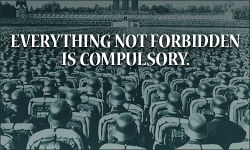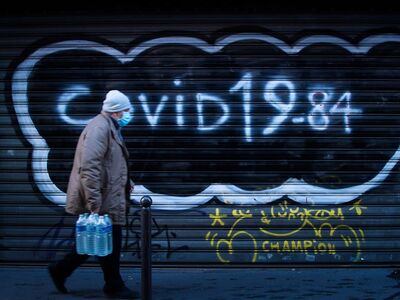Totalitarianism
(political system, loaded language) | |
|---|---|
 | |
| Interest of | • Hannah Arendt • Big Brother Watch • Mattias Desmet |
“Totalitarianism, however, does not so much promise an age of faith as an age of schizophrenia. A society becomes totalitarian when its structure becomes flagrantly artificial: that is, when its ruling class has lost its function but succeeds in clinging to power by force or fraud. Such a society, no matter how long it persists, can never afford to become either tolerant or intellectually stable. It can never permit either the truthful recording of facts or the emotional sincerity that literary creation demands.”
George Orwell The Prevention of Literature [1]
Contents
Official narrative
The official narrative for most of the world is that "Since we live in a democracy, it could never happen here..." From a global perspective, this has never looked less convincing than in 2021, reviewing a year in which most nation states experienced a sudden lurch towards authoritarianism, simultaneously restricting freedom of movement, freedom of speech and freedom of assembly, nominally a response to the threat posed by COVID-19.
Characteristic practices
“One of the hallmarks of totalitarian systems is the criminalization of dissent. Not just the stigmatization of dissent or the demonization of dissent, but the formal criminalization of dissent, and any other type of opposition to the official ideology of the totalitarian system. Global capitalism has been inching its way toward this step for quite some time, and now, apparently, it is ready to take it.”
C. J. Hopkins (5 May 2021) [2]
Scapegoating
Scapegoating, a psychologically method of reaffirming group identity and allaying death anxiety (see Ernest Becker) is a common practice in authoritarian governments. This is an important part of the permanent wars within society, such as the "war on terror" and the "war on drugs".
Culture
“The first thing every totalitarian regime does, along with confiscation and mutilation of reality, is confiscation of history and confiscation of culture. I think they all happen almost simultaneously."”
Azar Nafisi [3]
Mental health
Repressive governments have a long history of equating dissent with mental illness.
"Conspiracy theories"
- Full article:
 “Conspiracy theory”
“Conspiracy theory”
- Full article:
Following the CIA's efforts of the late 1960s to undermine criticism of the Warren Commission report, the phrase "conspiracy theorist" became a focus of such efforts. This was stepped up in the 1980s by the commercially-controlled media as a more general purpose project to smear dissent and discourage investigation of the large scale conspiracies that the US deep state was undertaking.
Academic research
- Full article: “Conspiracy theory/Academic research”
- Full article: “Conspiracy theory/Academic research”
In the 1990s, the academic community joined big media in an effort to promote the concept; academic research into "conspiracy theories" was carried out. For over a quarter of a century, this research has avoided discussion of the content of theories, but focused instead on the theorists. After proving by assumption that no large scale conspiracy was possible, academics inferred that those who subscribed to such beliefs were mentally deficient in some way and exerted a pernicious influence on society.
“the mind of the conspiracy theorist can hardly be changed, and surely not on mere logical grounds. These two elements, namely the ideation of hidden plots behind social events and the suspiciousness with which alternative accounts are regarded, have prompted historians to define conspiracy thinking as a form of collective paranoia.”
Bruno Castanho Silva, Federico Vegetti, Levente Littvay (2017) [4]
Problems with official narrative
In the summer of 1945, after the victory in Europe, the US an UK deep states needed a renewed enemy image of the former war ally the Soviet Union when they decided to start the Cold War. The Soviets were viewed positively in Western public opinion for their war effort.[5] The reinvigoration of totalitarianism applied to the USSR served to switch powerful anti-German sentiments into the growing anti-communist movement. It also allowed recruitment of former German collaborators and allies, especially from Eastern Europe, no matter how dubious their war history, in the new fight against Soviet totalitarianism. This "amalgam of distortions, omissions and pure invention"[6] continued after the Cold War, with books such as Bloodlands by Bilderberger historian Timothy Snyder.
The academic Jeanne Kirkpatrick[7] developed a distinction between authoritarian and totalitarian rule, where "authoritarian" was a way to distinguish between right-wing dictatorships that for reasons of convenience or necessity the United States supports. These are distinguished from left-wing ones that were dangerous to western capitalist interests and so are classified as totalitarian. So, the United States could classify alliances with theocracies like Saudi Arabia or Pinochet's Chile as "authoritarian", even though they may have more characteristics that are totalitarian. Conversely, Venezuela is classified as totalitarian.[8]
Examples
| Page name | Description |
|---|---|
| Global control grid | To the ambitious megalomaniac, 21st century technology is not only very enticing but also becoming more so. To the deep politicians of the Deep State, money is no object, so a whole range of grand schemes for technological control are conceivable. |
| Inverted totalitarianism | |
| Police state | Wikipedia terms a police state as a "fundamentally authoritarian" form of government, and cites examples of the Soviet Union and its satellites plus North Korea. No mention in the article of the 21st century global shift towards authoritarian policies lead by the USA, such as the removal of civil liberties and the use of universal surveillance or false flag terror. |
Related Quotations
| Page | Quote | Author | Date |
|---|---|---|---|
| Hannah Arendt | “Evil comes from a failure to think. It defies thought for as soon as thought tries to engage itself with evil and examine the premises and principles from which it originates, it is frustrated because it finds nothing there. That is the banality of evil.” | Hannah Arendt | |
| Ferdinand Grapperhaus | “Activists and extremists only provocate. I understand their emotion, but we need to make these individuals go away. Either behind bars, or else expel them from the country, or else fine them so many times that they'll only be able to be a paperboy.” | Ferdinand Grapperhaus | |
| Plastic word | “In certain kinds of writing, particularly in art criticism and literary criticism, it is normal to come across long passages which are almost completely lacking in meaning. Words like romantic, plastic, values, human, dead, sentimental, natural, vitality, as used in art criticism, are strictly meaningless, in the sense that they not only do not point to any discoverable object, but are hardly ever expected to do so by the reader. When one critic writes, ‘The outstanding feature of Mr. X's work is its living quality’, while another writes, ‘The immediately striking thing about Mr. X's work is its peculiar deadness’, the reader accepts this as a simple difference opinion. If words like black and white were involved, instead of the jargon words dead and living, he would see at once that language was being used in an improper way. Many political words are similarly abused. The word Fascism has now no meaning except in so far as it signifies ‘something not desirable’. The words democracy, socialism, freedom, patriotic, realistic, justice have each of them several different meanings which cannot be reconciled with one another. In the case of a word like democracy, not only is there no agreed definition, but the attempt to make one is resisted from all sides. It is almost universally felt that when we call a country democratic we are praising it: consequently the defenders of every kind of regime claim that it is a democracy, and fear that they might have to stop using that word if it were tied down to any one meaning. Words of this kind are often used in a consciously dishonest way. That is, the person who uses them has his own private definition, but allows his hearer to think he means something quite different. Statements like Marshal Petain was a true patriot, The Soviet press is the freest in the world, The Catholic Church is opposed to persecution, are almost always made with intent to deceive. Other words used in variable meanings, in most cases more or less dishonestly, are: class, totalitarian, science, progressive, reactionary, bourgeois, equality.” | George Orwell | 1946 |
Related Documents
| Title | Type | Publication date | Author(s) | Description |
|---|---|---|---|---|
| Document:The Essential Rules of Tyranny | webpage | 29 July 2011 | Brandon Smith | |
| File:1984.pdf | book | 1949 | George Orwell | George Orwell's classic and prescient 1949 dystopian novel about total surveillance in "Oceania", one of the world's then three warring power blocks. |
References
- ↑ https://www.orwell.ru/library/essays/prevention/english/e_plit 1946
- ↑ https://off-guardian.org/2021/05/05/the-criminalization-of-dissent/ Off Guardian
- ↑ https://www.zerohedge.com/political/america-playing-fire Zero Hedge
- ↑ The Elite Is Up to Something: Exploring the Relation Between Populism and Belief in Conspiracy Theories Political Psychology, Vol. 37, No. 5, 2016
- ↑ https://www.vox.com/2014/6/16/5814270/the-successful-70-year-campaign-to-convince-people-the-usa-and-not
- ↑ https://www.wsws.org/en/articles/2022/12/07/dbtz-d07.html
- ↑ http://www.commentarymagazine.com/viewarticle.cfm/dictatorships--double-standards-6189
- ↑ https://dissidentvoice.org/2020/10/totalitarian-anti-communism-loaded-languate-straight-out-of-cia-neo-con-playbook/
